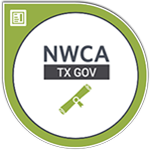PURPOSE
The Texas Government Specialist credential documents the essential competencies for general knowledge related to the government of the state of Texas.
AUDIENCE
This credential is appropriate for professional who requires knowledge of Texas government to support a career position including historians, history interns, anthropologists, archaeologists, archivists, museum curators and workers, economists, periodical editors and journalists, geographers, teachers and community educators, political scientists, sociologists, historical society staff, and those who write for a variety of purposes. Additionally, many professionals working for the state and in the criminal justice system in Texas must understand the unique characteristics and issues of Texas government. These professionals may include state workers, law enforcement officers, court staff, parole and probation officers, social workers and case managers, legal professionals, arbitrators and mediators, and many others.
JOB / CAREER REQUIREMENTS
These credentials document competencies including overall knowledge of the Texas government, policy, and politics. Though many of these positions require appropriate education at various levels and numerous types of training, a fundamental understanding of Texas government supports many aspects of the daily task and strategic decision-making.
TEXAS GOVERNMENT WORKPLACE TASKS:
- Historians gather and analyze historical and government related data, engage public in educational programs, archive and preserve materials and artifacts, provide guidance on historical topics and preservation issues, and write reports, articles, and media pieces on historical topics.
- Anthropologists and archaeologists study the environment and populations, collect and analyze government-related data, conduct research, write reports, make educational and information presentations, and provide guidance for policies, programs, and other endeavors.
- Museum curators, museum technicians, and museum staff manage collections, design exhibits and programs, manage museums, provide guidance on museum collections and topics, work with civic organizations for publicity and preservation of historical items, and conduct research related to government topics
- Editors, writers, and journalists read and write content for publication, evaluate submissions, create story ideas and content, research facts for stories, manage photo and illustrations for story support.
- Political scientists research and study political subjects, collect and analyze data, monitor current events and policy decisions, evaluate effects of policies on the people, and present research through reports, presentations, and articles, other methods.
- Teachers and community educators research historical and government topics, develop curriculum, present educational lessons using a variety of formats and at many different levels of education, and evaluate learning.
- Criminal justice professionals use their knowledge of the state court system to complete the daily tasks of their unique jobs ensuring the rights of citizens are upheld and protected and the laws and procedures of the system are followed.
EXAM STRUCTURE OVERVIEW
Number of Questions in Exam: 110
Total Time: 90 minutes
Overall Passing Score: 70%
(All sections require an individual passing score of 70%)

